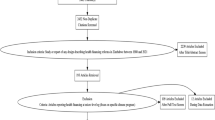Abstract
Background
After the fall of communism, Poland implemented one of the widest reaching programmes of socio-economic reforms. However, in comparison health system reforms were less radical. At the end of the 1990s a change process had been started, but the political fight for power has heavily influenced the health reforms and led to two different reform concepts being implemented over a period of a few years.
Aim
The paper assesses the chances of implementation of the reform proposed in 2001 to recentralise health financing and organisation by replacing regional sickness funds by a National Health Fund. A hypothetical model is proposed which is placed at the start of the reforms and compares the model to the actual political course observed.
Methods
PolicyMaker software was used for a political mapping analysis. The policy content (goals and mechanisms) was based on official political documents as well as verbal declarations made by key policymakers in the media, newspapers and magazines.
Results
The analysis showed that the political situation was in favour of the government implementing a single National Health Fund. Nevertheless, this generated a strong resistance by the political opposition, experts and health care workers which could be a substantial obstacle for the realisation and effectiveness of the implemented model. The feasibility of the project could have been increased by implementing a number of strategies aimed at modifying the attitude of key stakeholders and by introducing the proposed reform as part of an overall improvement of the work environment for health professionals.
Conclusions
The concept of a National Health Fund generated important opposition against the proposed changes in the health care system. With its majority in Parliament, the government was nevertheless able to establish the new system. The actual course of the reforms however contained a large number of formal errors, which led the Constitutional Court to rule the reform as unconstitutional. Substantial imperfection of the reform caused a destabilization of the whole health care system. In addition, defeat of the reform caused a decrease of electoral support for the governing coalition.



Similar content being viewed by others
References
Austin JE (1990) Managing in Developing Countries: Strategic analysis and operating techniques. Free Press, New York
Bossert T (1998) Analyzing the decentralization of health care systems in developing countries: decision space, innovation and performance. Soc Sci Med 47(10):1513–1527
Dietrich AR, Osak M (2002) Reforma reformy zdrowotnej w Polsce. Diagnoza wstępna. Polityka Społeczna 10:25–29 (In Polish)
Dudek A (2002) Pierwsze lata III Rzeczypospolitej 1989 – 2001. Wydawnictwo Arkana, Kraków (In Polish)
Kochanowicz J, Kozarzewski P, Woodwart R (2005) Understanding reform: the case of Poland. CASE, Warszawa
Kowalska - Koprowska I (2003) Reformowanie opieki zdrowotnej w świetle programów, ustaw i w opiniach decydentów. Zdrowie Publiczne i Zarządzanie 1(I):65–76 (In Polish)
Krajewski-Siuda K, Romaniuk P (2004a) Mapowanie polityczne jako metoda badawcza w obszarze polityki zdrowotnej. Zdrowie Publiczne 3:446–450 (In Polish)
Krajewski-Siuda K, Romaniuk P (2004b) Ocena szans realizacji koncepcji Narodowego Funduszu Zdrowia przy użyciu mapowania politycznego jako narzędzia analizy politycznej. Zdrowie Publiczne i Zarządzanie 2(II):76–85 (In Polish)
Kuszewski K, Gericke C (2005) Health Systems in Transition: Poland. WHO Regional Office for Europe on behalf of the European Observatory on Health Systems and Policies, Copenhagen
Lawthers AG, Różański BS, Niżankowski R, Ryś A (1999) Using patient surveys to measure the quality of outpatient care in Kraków, Poland. Int J Qual Health Care 6(11):497–506
Lindenberg M, Crosby B (1981) Managing development: the political dimension. Kumarian Press, West Hartford
Mills A, Vaughan JP, Smith DL, Tabibzadeh I (1990) Health system decentralization. Concepts, issues and country experience. World Health Organization, Geneva
Ministerstwo Zdrowia RP (2002) Narodowa Ochrona Zdrowia. Strategiczne kierunki działań Ministerstwa Zdrowia w latach 2002–2003. Ministerstwo Zdrowia, Warszawa (In Polish)
Pilonis D (2004) PZ ma już rok. Służba Zdrowia 63–66:9–10 (In Polish)
Rada Ministrów RP (2002) Decyzja Rady Ministrów o przyjęciu projektu ustawy o ubezpieczeniu w Narodowym Funduszu Zdrowia. Przegląd Rządowy 10(136):69–72. (In Polish)
Reich MR (1996) Applied political analysis for health policy reform. Curr Iss Public Health 2:186–191
Reich MR, Cooper DM (1998) PolicyMaker: computer-assisted political analysis. Software and Manual. PoliMap, Brookline
Rondinelli D, Nellis J, Shabbir Cheema G (1983) Decentralization in developing countries. A review of recent experience. World Bank, Washington
Rządowe Centrum Studiów Strategicznych (2002) Transformacja społeczno-gospodarcza w Polsce. Rządowe Centrum Studiów Strategicznych, Warszawa (In Polish)
Służba Zdrowia (2002) Oceniają politycy i menedżerowie. Służba Zdrowia 15–18:16–23 (In Polish)
Stanowisko opracowane na seminarium zorganizowanym przez Instytut Spraw Publicznych dnia 15 marca 2002 r. ws. dokumentu Narodowa Ochrona Zdrowia. Strategiczne kierunki działania Ministerstwa Zdrowia w latach 2002–2003. Antidotum 2002;5:42–44 (In Polish)
Stępień W (2003) “Opinia publiczna” o ochronie zdrowia. Zdrowie i Zarządzanie 5(V):41–44 (In Polish)
Trybunał Konstytucyjny RP (2004) Wyrok Trybunału Konstytucyjnego z dnia 7 stycznia 2004 r. Dz.U. nr 5 poz.37 (In Polish)
Tymowska K (2001) Health care under transformation in Poland. Health Policy 56:85–98
Włodarczyk C (1999) Droga do ubezpieczeń zdrowotnych. Wędrówka koncepcji reformatorskich w procesie polityki zdrowotnej. Zdrowie i Zarządzanie 2(I):13–28 (In Polish)
Włodarczyk C (2003) Reformy Zdrowotne-uniwersalny kłopot. Wydawnictwo UJ, Kraków
Acknowledgements
The Department of Health Policy at the Medical University of Silesia uses computer equipment purchased by the Medical Aid for Poland Fund in London.
Conflict of interest
The authors declare that there are no conflict of interests.
Author information
Authors and Affiliations
Corresponding author
Rights and permissions
About this article
Cite this article
Krajewski-Siuda, K., Romaniuk, P. & Gericke, C.A. Political analysis of the conception of the Polish National Health Fund. J Public Health 16, 153–159 (2008). https://doi.org/10.1007/s10389-007-0154-9
Received:
Accepted:
Published:
Issue Date:
DOI: https://doi.org/10.1007/s10389-007-0154-9




